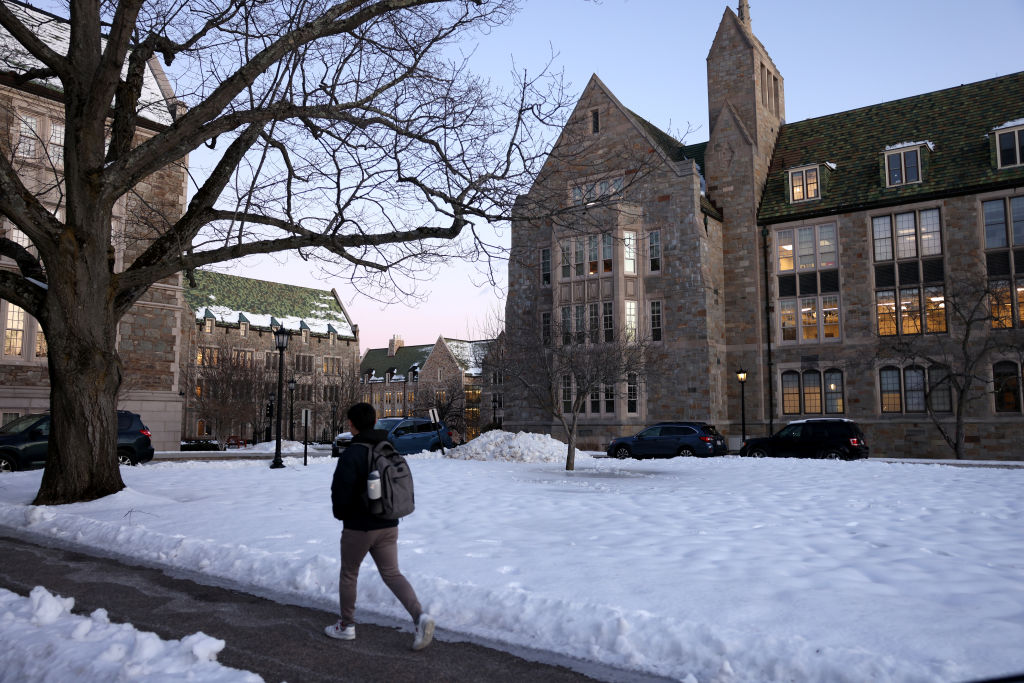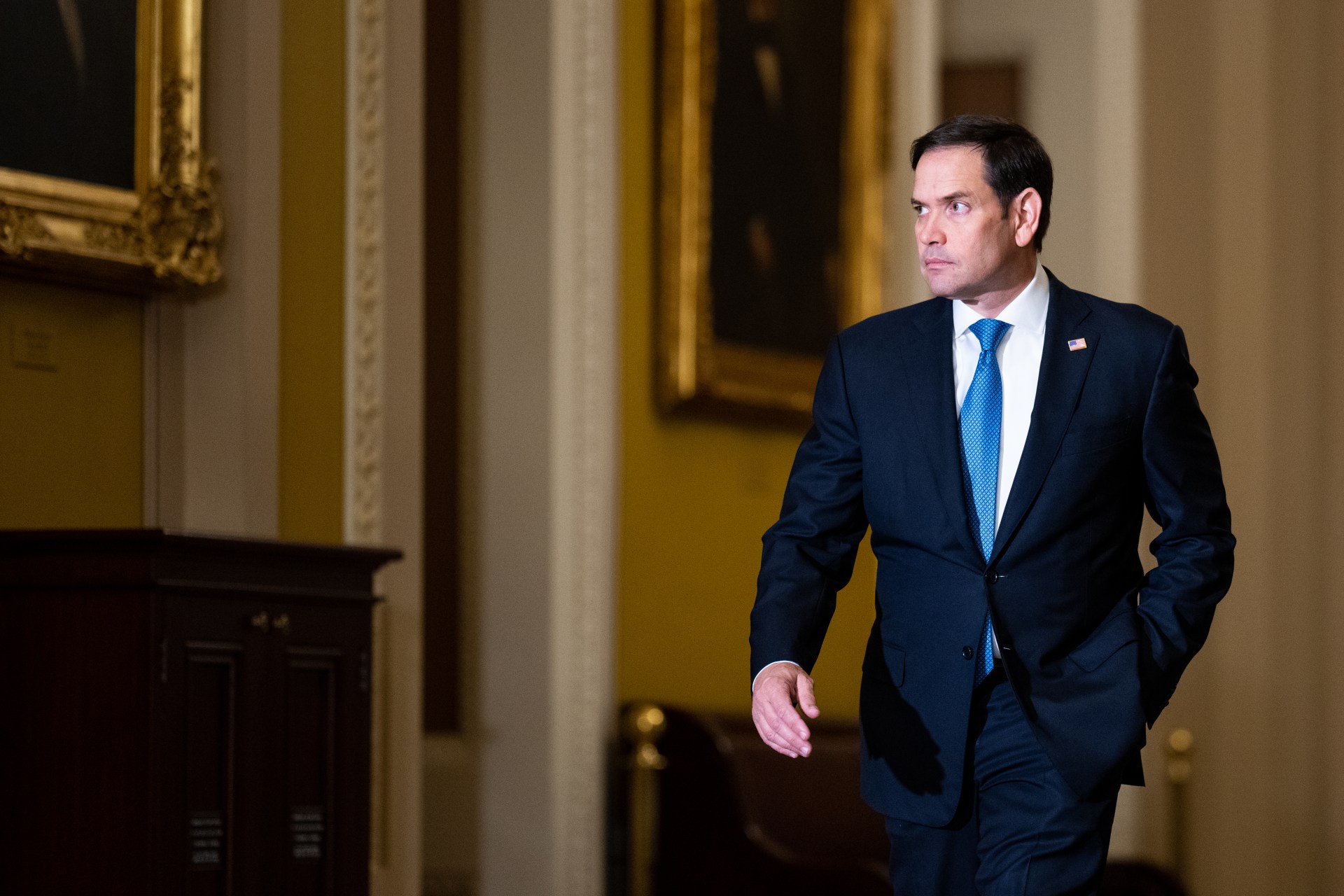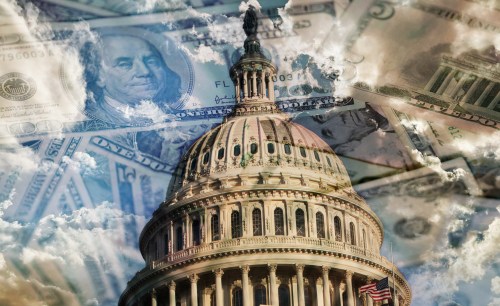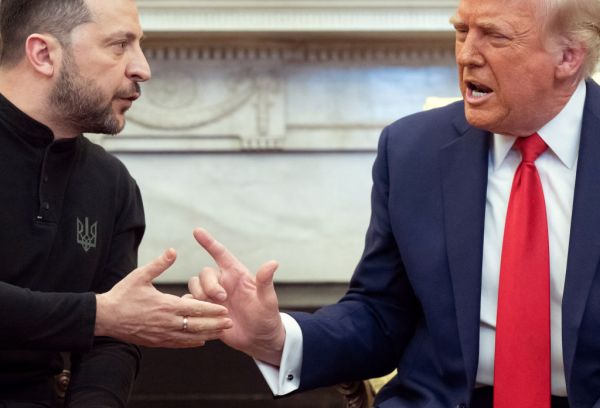Happy Tuesday! On this day 236 years ago, the United States Constitution officially went into effect as the law of the land. The date it ceased serving as the law of the land is, uh, a disputed matter.
Quick Hits: Today’s Top Stories
- President Donald Trump told reporters Monday that planned 25 percent tariffs on goods imported from Mexico and Canada, along with increased levies on China, would take effect Tuesday with “no room” for delay. The tariffs targeting the North American allies, which were originally scheduled to begin in February, were postponed for a month after last-minute negotiations with Canadian Prime Minister Justin Trudeau and Mexican President Claudia Sheinbaum. Both leaders have signaled that they are prepared to respond with retaliatory tariffs. U.S. stocks dipped immediately following the announcement.
- The U.S. has suspended all military aid to Ukraine at Trump’s directive, multiple outlets reported Monday. “We are pausing and reviewing our aid to ensure that it is contributing to a solution,” a White House official told Reuters. The decision, which followed a confrontational Oval Office meeting involving Trump, Vice President J.D. Vance, and Ukrainian President Volodymyr Zelensky on Friday, does not exclude the possibility of a U.S.-Ukraine minerals deal—something Zelensky said Sunday his country is still “ready to sign” despite conceding that an agreement to end the Russia-Ukraine war is “very, very far away.”
- Secretary of Defense Pete Hegseth ordered U.S. offensive cyber operations against Russia to be paused, according to multiple reports on Monday. The directive, which was issued late last month, was reportedly intended to bring Moscow to the negotiating table for talks aimed at ending the war in Ukraine. According to defense experts, the pause might simply be part of routine diplomatic maneuvering, but it may also curtail the ability of U.S. intelligence agencies to monitor and deter clandestine Russian actions, such as election interference, around the world.
- President Trump announced on Truth Social Sunday that the U.S. would pursue the creation of a “crypto strategic reserve” through the purchase of five different cryptocurrencies. Trump did not specify how much cryptocurrency the government would buy, but he said the fund would include the two most popular digital currencies—bitcoin and ether—along with the relatively unknown XRP, solana, and cardona currencies. After an initial surge, the values of the various currencies eased on Monday amid uncertainty about the plan.
- Health and Human Services Secretary Robert F. Kennedy Jr. wrote an op-ed for Fox News Digital on Sunday praising the measles, mumps, and rubella (MMR) vaccine in what appears to be a partial reversal of his previous vaccine skepticism. Describing the ongoing measles outbreak in West Texas as a “call to action,” Kennedy promised to “work closely with the Texas health authorities to provide comprehensive support,” including vaccines and therapeutic medicines, to the affected communities. But he maintained that the “decision to vaccinate is a personal one” and wrote that “good nutrition” is the “best defense” against the disease. At least 158 people—the vast majority of whom are unvaccinated children and teenagers—have been infected with the measles, and one school-aged child has died.
- The National Science Foundation (NSF) announced Monday that it would reinstate dozens of fired “probationary” employees—workers who have been recently hired or promoted—after a federal judge ruled last week that the Office of Personnel Management (OPM) could not direct mass firings of probationary employees in several other agencies. While the NSF was included in the original order demanding that OPM rescind the instruction until a judge examines the case more closely, U.S. District Judge William Alsup stated in an amended ruling Friday that the NSF was not included in the stay. However, the NSF said that it would be reinstating probationary employees who were veterans, disabled, or military spouses.
- Taiwan Semiconductor Manufacturing Company (TSMC), the world’s largest chip manufacturer, announced Monday that it would invest $100 billion in the U.S. over the next four years. The money reportedly will expand production capacity at the company’s CHIPS Act-subsidized manufacturing centers in Arizona, allowing TSMC to continue to relocate some of its operations from Taiwan. The announcement, which Trump touted as evidence of the success of his threatened tariffs, came amid the president’s attempts to boost American manufacturing.
- The Senate voted 51-45 along party lines on Monday to confirm Linda McMahon as education secretary. McMahon, a former World Wrestling Entertainment executive who co-chaired the Trump transition team, will now be tasked with overseeing the president’s efforts to dismantle the department she leads. “I want her to put herself out of a job,” Trump said of McMahon’s nomination last month.
- President Trump will deliver an address focused on what the White House described as “the renewal of the American dream” to a joint session of Congress tonight at 9 p.m. ET. In the speech, which comes on the heels of Trump’s contentious White House meeting with Zelensky last week, the president is expected to cover his plans for ending the Russia-Ukraine war, tech CEO Elon Musk’s efforts to overhaul the federal government, immigration policy, and the economy.
A Campus Conundrum

As university administrators attempted to wrap up a town hall to discuss the Trump administration’s efforts to eliminate diversity programs at federally funded schools last week, the packed theater erupted in applause in response to a heckler’s jeer: “Georgia Tech is selling minority students down the river!”
The Georgia Institute of Technology had called the meeting with campus leaders in response to a new Education Department directive ordering thousands of schools to gut their diversity, equity, and inclusion (DEI) programs or risk losing federal funding. And similar scenes played out on college campuses across the country, as administrators found themselves stuck between making sweeping changes to campus culture and complying with the broad directive ahead of its Saturday deadline.
Last month, the Education Department’s Office of Civil Rights (OCR) issued a “Dear Colleague” letter outlining its new enforcement policies regarding DEI initiatives in both universities and K-12 schools. Though the letter itself is not legally enforceable, it established guidance to school administrators on how OCR plans to interpret existing federal law, including ...
As a non-paying reader, you are receiving a truncated version of The Morning Dispatch. You can read our 1,164-word item on the Trump administration’s DEI directive in the members-only version of TMD.
Today’s Must-Read
For the hawks who once supported and worked for him, Secretary of State Marco Rubio’s turn toward a Trumpian realism is all the more frustrating because of a sense that the former Florida senator knows better. What they saw in Rubio’s blank expression at the White House on Friday was perhaps recognition that this was not what the once-proud Reaganite had signed up for.
Toeing the Company Line
The Grand Ol’ Gimmick Party
There are ways to address our dire fiscal situation. Budgeting tricks and pseudo-theories are not among them.
The End of ‘Trump Derangement Syndrome’
Ukraine and the sum of all fears.
Microsoft’s Quantum Computing Breakthrough, Explained
It claims—but has yet to prove—a leap forward in quantum processors.
Rod Rosenstein and Robert Hur Talk Special Counsels
‘I thought that this was going to be an unpleasant task.’
Is Liberalism a Luxury Jews Can’t Afford?
Jews on offense.
Worth Your Time
- The British economy has been in the doldrums for well over a decade—and according to Derek Thompson, writing for the Atlantic, it’s a self-inflicted wound. Housing and energy production, two foundations of the modern economy, have been crippled by a slew of regulations combined with local opposition: “With more choke points for permitting, construction languished from the 1950s through the ’70s. Under Prime Minister Margaret Thatcher, the Conservatives rolled back nationalization in several areas, such as electricity and gas production. But their efforts to loosen housing policy from the grip of government control was a tremendous failure, especially once it was revealed that Thatcher’s head of housing policy himself opposed new housing developments near his home. … Despite Thatcher’s embrace of North Sea gas, and more recent attempts to loosen fracking regulations, Britain’s energy markets are still an omnishambles. Per capita electricity generation in the U.K. is now roughly one-third that of the United States, and energy use per unit of GDP is the lowest in the G7. By these measures, at least, Britain may be the most energy-starved nation in the developed world.”
- Los Angeles has begun rebuilding from the Palisades fire, including drawing up plans for new, affordable apartments to replace rent-controlled housing in the wealthy enclave of Pacific Palisades. There’s just one problem: NIMBYs. In the Los Angeles Times, Liam Dillon examines a neighborhood that’s divided over how to move forward with the process of reconstruction. “Because of its wealth and high-quality amenities, Pacific Palisades fit the description of a community prioritized for affordable housing under state and local policies, with the potential for projects to receive financial and zoning incentives. That not only would include homes for middle-income earners, but also the army of lower-income gardeners, housekeepers and nannies that marched into the neighborhood every day to work. Fear of a push for low-income housing fueled a conspiracy theory that Gov. Gavin Newsom was using the disaster to rezone the Palisades from single-family homes to apartments,” he wrote. “Chris Spitz, who has lived in the Palisades for more than three decades, has been active in the neighborhood council for many years. She’s hoping to rebuild her own home and said the rent-controlled apartments that lined Sunset Boulevard allowed those who otherwise couldn’t afford the Palisades to raise their families there. She’d like the buildings to return. But not new ones.”
Presented Without Comment
The Moscow Times: Kremlin Says U.S. Foreign Policy Shift Aligns With Its Own Vision
“The new administration is rapidly changing all foreign policy configurations. This largely aligns with our vision,” Kremlin spokesman Dmitry Peskov told a reporter from state television.
“There is a long way to go because a lot of damage has been done to the whole complex of bilateral relations. But if the political will of the two leaders, President Putin and President Trump, is maintained, this path can be quite quick and successful,” Peskov added.
Also Presented Without Comment
CNN: Scientists Have Identified a New Coronavirus in Bats, but It’s Not a Public Health Threat
Also Also Presented Without Comment
The Boston Globe: The Vermont-Quebec Border Runs Right Through This Library. Trump Officials Used It to Stoke Tensions.
On a trip to Vermont following the fatal shooting of a US Border Patrol agent, Secretary of Homeland Security Kristi Noem visited the Haskell [library], where she stepped up to the electrical tape and, with a grin, parroted Trump’s taunts while standing on the Canadian side of the line, according to Converse and Deborah Bishop, the library’s executive director.
“She stood on the American side and said, ‘USA No. 1.’ Then she crossed the line and said, ‘The 51st state,’” Bishop said. “She did it at least three times and was very clear in saying, ‘USA No. 1,’ and didn’t even say ‘Canada.’ Just, ‘The 51st state.’”
In the Zeitgeist
Comedian Shane Gillis hosted Saturday Night Live for the second time on Saturday, and we think this skit is one of the show’s best in a long time. We don’t recommend it as medical advice, though.
















Please note that we at The Dispatch hold ourselves, our work, and our commenters to a higher standard than other places on the internet. We welcome comments that foster genuine debate or discussion—including comments critical of us or our work—but responses that include ad hominem attacks on fellow Dispatch members or are intended to stoke fear and anger may be moderated.
With your membership, you only have the ability to comment on The Morning Dispatch articles. Consider upgrading to join the conversation everywhere.